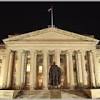Federal Reserve rates unchanged
The Federal Reserve is keeping U.S. interest rates at record lows in the face of threats from a weak global economy, persistently low inflation and unstable financial markets.
Capital will remain cheap globally in the second decade of the 21st century; that is the larger reading from the decision of the Federal Reserve last night to keep the interest rates unchanged.
Fed chief Janet Yellen and her committee members are convinced that despite the huge inflow of capital into the US economy and by extension in the world economy, there is still little chance that US inflation will shoot up from the current 0.2 per cent.
Inflation would climb only if some of the excess capital in the global markets can be yoked with labour to produce goods and services that people would buy. This is still not a given in most of the developed economies. Japan went through a similar long phase in the last century and is still not really out of there.
US seems to be settled firmly in that spot for an equally long haul despite plenty of optimism that the Fed had espied a turnaround, which included some robust comments from vice chairman of the Fed Stanley Fischer last month there is “good reason to believe that inflation will move higher as the forces holding down inflation dissipate further”.
This is a serious problem for the Indian economy. If the US, Japan and now even China cannot use that tsunami of capital, it will break into markets where it will find a sliver of chance of earning some returns. The OECD report this week is clear India will be the fastest growing economy in the world, for at least two years. So the capital could again be upon the Indian shores pricing out domestic money from banks. RBI deputy governor Urjit Patel said 20 per cent of Indian credit is now being financed from abroad with domestic banks and non-banking companies dividing the rest equally.
Michel Lies, group chief exective, Swiss Re, the second largest re-insurance company in the world said capital was costly in India primarily because of the twin deficits–fiscal and current account or the internal and external ones. To the extent these deficits were easing up the cost of capital in India would go down too.
Speaking at an event jointly organised by Ficci, its affiliate ICC and Delhi based think tank India Foundation, minister of state for finance Jayant Sinha agreed with them. Domestic capital was relatively costly in India “not all of which was due to RBI”.
Flattening out the cost of capital between India and abroad will be possibly the biggest challenge in the financial sector for the Modi government since the rest of the world does not seem inclined to do so for a long time.
Kindly send reply or comments on this topic to [email protected]
Source:Indianexpress




